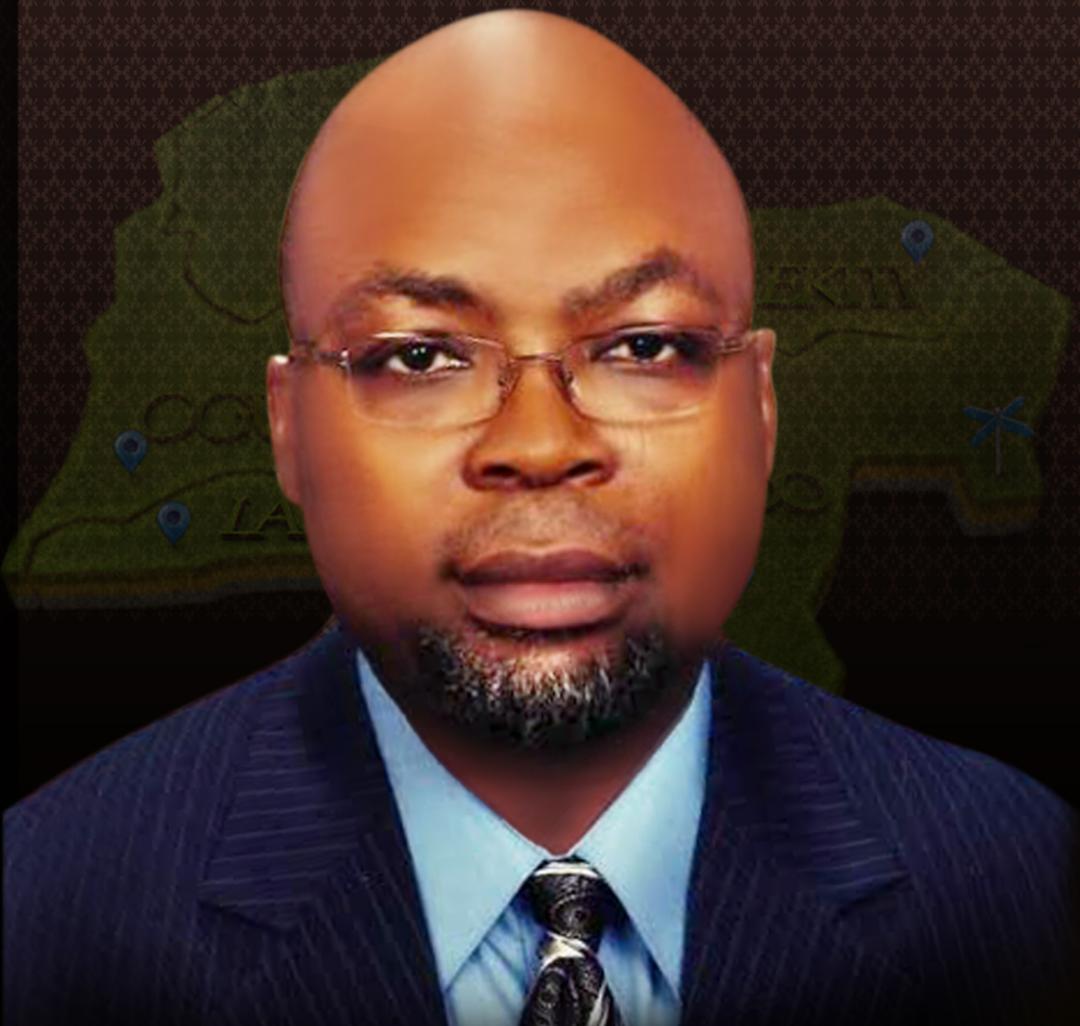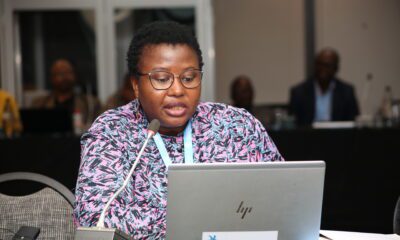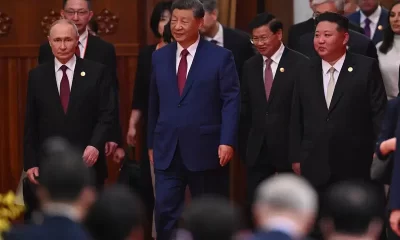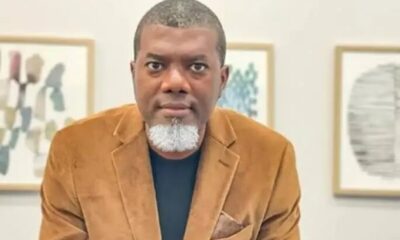Democracy & Governance
Voice for the Voiceless, the Uncelebrated Figures of the Nigerian Modern Democracy: Bukola Saraki -By Olusegun Bamidele Abejide
Democracy and economic growth are proportionally related and affect each other. From a personal school of thought, democracy can be used to build an economy because it supports economic institutions. It attracts both domestic and foreign investments directly. A strong economy is equally needed to maintain democracy, and this is only possible through having the right people in a leadership position.

A CASE STUDY OF GOV. (DR.) ABUBAKAR BUKOLA SARAKI
Many may wonder if Nigeria’s democracy is anything to be proud of in over twenty years of civilian rule after successive military regimes. My interactions with people from different hues have allowed me to learn what democracy really is. My stay in the United States as well has given me an illustrious chance to experience American Democracy. My experience may not interest you, but it gives me the temerity to examine the people who have fought for my country’s democracy from 2015.
Candidly, democracy is good, and I can say without an iota of doubt, it is one thing that the entire humanity should be proud of. There is this particular conversation I had with one of my friends about Nigeria’s democracy. According to him, Nigeria has not realized any substantial democratic transition yet. To me, this is untrue. Don’t we hold democratic elections? We do. I do not agree with anyone that thinks our country is wide off the mark to achieve democratic leadership. In recent years, Nigeria has had towering figures of democracy such as Dr. Abubakar Bukola Saraki. This is enough to certify that Nigeria is an emerging democracy. Recently, an Al Jazeera reporter, Hamza Mohamed asked a central question about our democracy: “In the 20 years of popular government, has Nigeria improved?” You have the answer. The reporter goes on to indicate pomp and color that characterized the transfer of power from the Generals to a civilian leader, the former President Olusegun Obasanjo who was in 1999 democratically elected as the president of Nigeria. The reporter’s analysis shows a positive turn in our economy.
Likewise, as referenced by an Abuja-based financial specialist, Aliyu Audu who was cited by Al Jazeera, “the economy is improving now because there is the more noteworthy dimension of trust in our economic institutions. There are additionally, progressive foreign investments when contrasted with the military period.” Essentially, what is abstracted from this reporting is that Nigeria’s economy has grown markedly on accounts of democratic progression.
Let us not forget, Nigeria’s democracy is young. And political personalities such as Dr. Bukola Saraki – Nigeria’s ex-Senate President, particularly in the 2015-2019 period has contributed considerably to the growth of our democracy. For democracy to mature, some people must act with self-abnegation. Dr. Saraki, throughout his reign as Kwara State’s two-term governor and Senate President, has shown us that sometimes we ignore our democracy giants. You may hold a wholly opposing view about him, but he remains relevant to Nigeria’s democratic struggles. With all that stated, I dedicate this chapter to examine Dr. Abubakar Bukola Saraki’s contribution, experience, and vision for this oil-rich West African Country-Nigeria.
ROUGH EXPERIENCE AND PARTY SWITCH ENERGIZED DR. SARAKI TO FIGHT FOR DEMOCRACY
Although he has had failings, he is a human being – remember that! Dr. Saraki has epitomized what true democracy is. From being a governor and senator to trying to seek the presidency, he has proved that democracy creates space for freedoms and growth for everyone. He is not the president today, but his strive to reinforce Nigeria’s democracy as Senate President will outlive him. In a democratic dispensation, people have limitless opportunities to achieve their reasonable desires. Saraki trained as a medical doctor, nevertheless believed that he could serve Kwara State and Nigeria at large in political leadership. Some people may attribute his success to political pedigree, but do not be blind to his struggle to build up democracy, particularly as a Senate president of Nigeria.
Now that Nigeria is not a one-political-party nation, political leaders have the liberty to decide where to belong. This gave room for a clear demarcation between progressive leaders and those keen on dragging behind independent Nigeria for their gains. President Winston Churchill once paraphrased this kind of situation this way: “some people change their principles for the sake of their political party, while others change their political party for the sake of their principle.” If this is the case, then, there is no need for killing or hating ourselves unnecessarily because of party-switching. Only the intolerant people would perceive party switching undemocratic. We are more mature than that. Remember what happened between the NCNC and ACTION GROUP parties in the 50s and 60s. To the well-established societies like Europe and America, it was a brilliant move. But, to the immature society, this brought enmities within themselves and still exists today. This kind of dog-eat-dog in the realm of animality should stop in our society. In the realm of humans, pettiness is nothing, totally useless. However, human beings embrace each other and move forward.
In a personal struggle to seek political survival, Dr. Saraki demonstrated that party switch is healthy for democracy. He has exposed that party hopping is not indecisiveness, but a normal phenomenon in a functioning democracy. I say it again, this is good for democracy. In a civilized society, people are informed and should be free to belong to a political party that befits them or stick to their continuum of ideologies. In his quest for the top job in 2018, the ex-Senate President, Saraki defected to a major opposition party, Peoples Democratic Party (PDP), on grounds of incompatible principles with the ruling All Progressive Congress (APC). This rubbed his opponents the wrong way. All the same, this was probable. Nonetheless, it is unreasonable to bury heads in the sand by ignoring the individual liberty to belong to a party of one’s choice.
Nigeria is a liberal democracy; though, a weak one. Elected representatives are bestowed with decision-making power. Dr. Saraki’s decision to switch sides demonstrates that for Nigeria’s democracy to blossom, nobody should be pilloried for leaving a party for another if they no longer align with their values, ideologies, and beliefs. In all fairness, belonging to a political party that aligns with an individual’s belief system is all that politicians want, and that is flat. Party switches happen, not only in immature democracies but also in burgeoning ones. In the United States, the defection of boisterous and sturdy Southern conservative, Strom Thurmond in 1964 is one best-case scenario to justify Saraki’s defection in a true democracy. Thurmond quit the Democratic Party to join the Republican Party. He was a South Carolina Senator, and once took a stab at the presidential race in the U.S. while riding on a segregationist party, Dixiecrat. In his book titled, “Making the American Century: Essays on Political Culture of Twentieth-Century America,” Bruce J. Schulman views this as a historic shift in American national politics. Though it is unpalatable to agree with what Thurmond stood for as an advocate of Southern States’ rights to oppress and dehumanize the Black people, he still epitomizes party switches as a touchstone of any liberal democracy. And many more have happened since then.
As earth-shattering as Saraki’s decision to cross the aisle in 2018 is, it is central to see it as a democratic exercise. Leaving the ruling party, APC to join the opposition party, PDP puts him at loggerheads with Buhari’s administration that set all guns blazing on him in all probability to bring Saraki down. This was expected, owing to the undeniable fact that many party leaders, especially in African democracies perceive opponents as archenemies. However, this was a tectonic shift in Nigeria’s national politics; given that it was a high-ranking official third in line after President Muhammadu Buhari and his vice. Sometimes, party switches happen not based on ideologies, but to satisfy political ambitions. And this has happened in many democratic countries such as Kenya, where it is not uncommon for politicians to hop from one political outfit to another, with no care for principles within those political vehicles.
Political parties in emerging democracies are hell-bent on building a personality cult that can deny other visionary leaders an opportunity to transform their nations. In Africa, political parties have been personalized and there was no way President Buhari would have accepted a challenger in his ruling party. It is crystal clear that Buhari’s first term lacked clout and vision that wiggled out his predecessor, Goodluck Jonathan from power. He rode to power as a transformational leader on ‘Change’ mantra and a roadmap to fight corruption, but that came short as Nigeria’s economy dwindled. With a big man syndrome and cling-to-power obsession in Africa, Dr. Saraki had a slim possibility of carrying the APC presidential ticket. Perhaps this is one of the reasons that set him off to PDP.
Undeniably, Dr. Saraki was set to be one of the presidential frontrunners in 2019 hotly contested and tense race targeting to unseat President Buhari had he won the PDP ticket. Do not ignore that sitting presidents in Africa are very manipulative and scheming when their power is threatened. The rapid rise to prominence by Dr. Saraki had to be stopped through wild corruption and robbery allegations. Enmeshed in false asset declaration that attracted a considerable 18 count charges before the Code of Conduct Tribunal, Dr. Saraki’s doggedness to ascend to presidency hit a snag. The charges were shot down to three, but it was not a sigh of relief for a presidential candidate. The police dragged him into Offa bank robbery scandal that took place in his home Kwara State with a laughable piece of evidence. In their uncultivated assertion, the police said that a gang leader connected to the burglary was pictured at the wedding of Saraki’s daughter in Kwara State. Besides, the gang leader was said to have been clad in similar Ankara clothing at the nuptials. These were attempts to contaminate Dr. Saraki’s expanding political influence and to block his ascent to the presidency. Still, there is hope even though the ride to Nigeria’s presidency was a depressing one for Dr. Saraki considering that he lost the PDP ticket and had charges tagged on his back.
Competitive politics is healthy for an emerging democracy; however, Nigeria has to slay the impending monster. The ogres of a political witch hunt, false allegations and personal attacks directed at political opponents have to stop if we are going to move forward. Democracy requires that political actors sustain competition through policies that are pro-development instead of character assassinations. What does a man have to gain by holding onto power instead of creating a favorable socio-economic environment where all and sundry have equal opportunities to succeed? This is a fundamental question that all Nigerian leaders should look forward to answering as they consolidate power. By answering soberly this question with an abstemious mind, Nigeria will have a political environment where true democratic leadership will be exercised.
I do not doubt that if Dr. Saraki supported President Buhari, charges that were pressed against him would not have seen the light of the day. The presidency would have felt that their policies would sail through the senate and in effect nobody in the government would have dared accuse him of any wrongdoing. As a man of principle who is gritty to fight for true democracy where every Nigerian could choose to belong to a political party of their choice at any time, he could not give in to threats. He stood firm and protected the independence of the senate, something that rarely happens in Africa. If he were obsequious, he would have swiftly allowed the presidency to destabilize the independence of the senate.
While I am bighearted to say that Dr. Saraki had a rough ride following the aforementioned allegations, I would say that this is a leader that was not threatened by intimidations from the executive. He allowed his conscience and the public interest to supersede individual interests that stubbornly sought to weaken and persuade him into supporting corrupt and non-performing leaders to secure “undisturbed life.” In contrast, endless threats and investigations from the police did not deter him from serving the public. He walked and worked as a free man amid bludgeons from the police who no longer exercised their semi-autonomy to carry out their duties.
In truth, one interesting thing to me is that this man was unmoved by accusations and threats canalized to him by a government that tried to use anything humanly possible to implicate him. The courage Dr. Saraki displayed by standing his ground to serve the senate with bipartisanship justifies his undeterred devotion to growing our democracy. He has shown Nigerians that, in the face of intimidations to support a cause that you do not believe in at all, the best thing to do is to remain adamant. You ought not to be a namby-pamby kind of a person if you are a democracy advocate in a nation where leaders are devotees of dictatorship. You should be firm in what you believe in and if that would mean switching to another political party, you must do so. We need not stick to a place that no longer supports the values and principles that are critical for democratization. We must willingly switch parties and stay in a party that accommodates us as well as grows democracy. Besides, we should not be demoralized when championing democracy even if we are threatened regularly by the government or the police.
DR. SARAKI’S PERSPECTIVE ON NIGERIA’S DEMOCRACY
Democracy building is not a one-day event and by all means, it is a political and institutional process. The epochal transition of the military to civilian rule in 1999 set a stage to cultivate Nigeria’s democracy. National Democratic Institute (NDI), (a non-profit organization working to strengthen democratic institutions in emerging democratic nations) has been at the heart of supporting and fortifying democratic institutions with a view to making Nigeria a true democracy. Since 1999, NDI has not relented in growing Nigeria’s democracy because it understands that it is a process that needs a fundamental transformation of the constitution, judicial system, and respect for independent institutions.
Nigeria, on June 12, celebrates Democracy Day, not “Dictatorship or Authoritarianism Day,” on account of the desire to be a democratic nation. While acknowledging the successful direction to democratize Nigeria, Dr. Saraki holds the view that it is within the realm of possibility for our country to nurture its democracy. In the run-up to 2019 general election, the former president of the eighth Senate, Federal Republic of Nigeria, Dr. Saraki said this in a Democracy Day Lecture at the International Conference Center held in Abuja, “Our democracy is very fragile. It behooves on us to strengthen it as a nation.”
There is no lie here. It is an absolute truth about our democracy; Nigeria’s democracy is indeed fragile, though its fragility can be overcome. In its feebleness, our democracy can fall to either side. It can lose headway or take a positive turn. This is all dependent on the political leaders and the will of the people. In his own words, he thinks it will take people from all walks of life across beautiful Nigeria to fortify democracy. Of concern is whether Nigerians are prepared to obey this clarion call. In his capacity, it is difficult to strengthen democracy, especially when working under a President of the Federal Republic of Nigeria that has put aside the rule of law.
Democracy can become a cropper in a political ecosystem where the president can fire judges at will or strangle other arms of government. Regrettably, President Buhari sacked Nigeria’s top judge and head of the judiciary, Walter Onnoghen. This was seen as an attempt to muzzle and weaken the judiciary in the run-up to the 2019 presidential election. Justice Onnoghen had previously adjudicated electoral disputes independently, and the fear for his effrontery stands to be a reason for throwing him out. It was a direct insult to the efforts of building Nigeria’s democracy-a blow to the principles of checks and balances and separation of power. So, those who tongue-lashed Dr. Saraki were blind to the reality of the intricate power play and deft political maneuvering that confronted him. This is a man that stressed the need to respect the principles of checks and balances.
Progress of democracy is hinged on how the arms of government respect each other, without disregarding edicts of the constitution or rule of law. As Senate President, Saraki asserted that the executive, judiciary, and legislature must exercise independence, but within the dictates of the constitution. Even as he held the position of Senate President, he exercised independence of the legislature even though the executive used the police to intimidate vocal opponents. Senators such as Dino Melaye and Saraki himself were dragged to court to answer to charges, which were widely perceived as a political witch hunt. Mr. Saraki presided over a legislature that he believed is the bedrock of democracy. He further insisted that the legislature must stand true to its independence. He once reiterated to the senators-elect and members-elect of the 9th assembly at an event convened at Nicon Hilton Hotel, Abuja by the National Assembly management: “In its constitutional role, the National Assembly carries out oversight, makes laws and ensures constituency representation. In carrying out constitutional functions, lawmakers must always recognize that the independence of the legislature is non-negotiable.”
Mr. Saraki envisioned a Nigerian government that will treat the Senate as co-equal partners in advancing democracy. He equally lobbied for members of the National Assembly to protect the principle of separation of power as a basis for enhancing democracy and good governance. It was a powerful message that Nigerians have recently witnessed from leaders like Dr. Saraki. His coming out of the woods to ask legislators to stand their ground and act independently to make laws that brace democracy is an apparent testament of his push for democracy. Despite being required to be a co-equal arm of the government, Dr. Saraki called for a change of tact. The change involved the altering of perception of the legislature. The public thinks the legislature is the weakest branch of government when it is the one that makes laws, oversights, and represents the people.
In his vision, Dr. Saraki regarded the legislative arm of government as crucial to the democracy of Nigeria. Dr. Saraki remains on record for fighting tooth and nail to keep the legislature strong and independent to counter well-calculated attempts by the executive to control it. However, many ordinary people do not realize that is how to promote or support democracy. In Saraki’s leadership at the Senate, key bills that are important for the democratization of Nigeria were passed. To enhance transparency and accountability, Dr. Saraki through his decision-making power made NASS’ (National Assembly’s) budget a permanent policy. This followed lengthy engagements and pressure from civil society organizations. An ‘open’ NASS became a permanent policy and allowed the public to know the nitty-gritty of the budget of the National assembly. I think we should see this as a step in the right direction. It will ensure that the financial resources of Nigeria are handled in an accountable and transparent way.
As momentous as Saraki’s decision to make NASS budget public, more institutions in Nigeria are likely to follow suit. In a democratic society, citizens expect public institutions to perform their tasks transparently and Saraki put his country on that path through the opening of NASS permanent policy. In modern Nigeria, the federal government tables its budget proposals before the Senate for deliberations. This is something that was not previously given much attention. Transparency and accountability, no doubt, are central to democracy. Although budget transparency for the National Assembly was a failure given that the budget lines were not disclosed, Saraki strove to enhance transparency. Budding democracies have a phobia to be transparent and accountable to the public. But Saraki considered the NASS budget as a tremendous decision that will in many years to come promote transparency and accountability.
Over 290 bills passed under Saraki’s Senate Presidency, which was a great achievement. The preceding (7th) Senate passed only 128 bills, but under him it was exceptional. Sorry to say, many will not consider it as a great success for democracy. Has anyone in the country commended him for this fantastic achievement? Importantly, Saraki came in as a visionary senator and Senate President with his eyes set on raising the bar high for the legislature. He envisioned it as the bedrock of democracy that is fundamental in making Nigeria a freer society.
Today, through the Not-Too-Young-To-Run bill, a person who is 35 years can run for president, a significant reversal of the 40-year age limit. Also, those interested in the gubernatorial seats can run at the age of 30. Before Saraki, the age limit to seek such a position was 35 years. You ought to regard this as a move to allow the Young Turks to drive Nigeria’s democracy in the right direction. Lest we forget, Saraki also led other senators to address security challenges facing the nation. Security is the role of the executive, but as a leader of the senate, Mr. Saraki led senators to address rising insecurity in the country. In the course of his term, he convened security meetings and presided the passing of resolutions to address security crises. The executive never paid attention to them, but the Northeast Development Commission Bill which is in effect today was passed to help victims of insurgent attacks. In genuine terms, Saraki’s Senate was effectively led, and it sought to strengthen the democracy of Nigeria. His record of passed bills is proof of vigor and determination to use the legislative body to make laws that will shape Nigeria’s democratic space for many years to come. Little attention is paid to his successes as a Senate President.
However, modern democracy needs leaders to make policies and laws that create an environment where human rights and freedoms are respected and observed. Mr. Saraki championed a democracy where different leaders can cooperate and support each other instead of brewing enmity that hurts the public. Cooperation and respect for every institution, in his mind, were significant for improving public service delivery and bolstering good governance.
SARAKI SENATE LEADERSHIP
In previous pages, you must have come across the phrase “Saraki leadership.” The context of this phrase is hinged on how he led Nigeria’s senate. In the preceding topic, Dr. Saraki’s perspective on Nigeria’s democracy, I underscored his insistence on the independence of the legislature. Here, let us delve deeper into his leadership at the senate. Because of his stellar performance and determination to keep the senate independent, he attracted aversion. In some scenarios, one would have expected him to be the President’s “errand boy.” But never was he obsequious. He is absolutely a man of principles. He treated the Senate with lots of decorum, but not without intimidations and forgery allegations coming his way.
President Buhari and his operatives wanted a man they can control, a senate president they could manipulate and use to sail their agenda through the Senate without scrutiny. Saraki did not budge. He never caved in, instead, he chose to stand firm and repelled the selfish gains that usually come with bootlicking failed regimes. He stressed to the executive that the National Assembly will exercise its independence and push for public interest. Is this not laudable? By withstanding tribulations and unending legal and political battles, Saraki remained indomitable. He remained unmoved, on course to move Nigeria forward. Very few people can fall out with the ruling party and still succeed in their mandate.
In some political tumult, some leaders can opt to pursue individual interests for political survival. Saraki was not that type of gullible leader. He stood his ground to lead the senate in the right way. As a democratic leader, Mr. Saraki was invariably bipartisan; he was not biased at all. He gave every senator an equal opportunity as he fostered cooperation. It is collaboration and team building in the Senate that made it possible to pass 298 bills under his watch. As I said earlier, the seventh senate only struggled to pass a paltry 128 bills. We all agree that the buck stops with top leadership. With all due respect, it was Saraki’s democratic governance or leadership that inspired those enacted laws. In any case, the Senate under Saraki focused on enacting laws that centered on democracy, security, and economy.
In many years to come, Saraki’s laudable contributions to use his power as Senate president to enact laws will dominate national discussions. Democratic institutions in Nigeria are set to become stronger, courtesy of Saraki-led senate. For instance, in July 2017, senators passed the Whistle-blower Protection Bill. It was a critical bill that empowers Nigerians to disclose corrupt practices in either public or private companies. Other bills such as NASS Budget (OpenNASS) and FOIA (Freedom of Information Act), although passed after serious civil society activism, they are key in bolstering democratic institutions. The coming into effect of these bills will expand transparency and accountability in Nigeria. These important bills were passed immediately Mr. Saraki took office; he showed readiness to support any transparency reforms in the country.
Before Saraki, an institution like the National Assembly ran undisclosed budgets. The public was not in a position to know how a legislative body entrusted with the power to enact laws was spending its financial resources. Under Saraki’s leadership, the situation changed and today, Nigerians can scrutinize the National Assembly (NA). Please, do not ignore that kind of magnificent achievement. Saraki did not oppose the release of the NA budget; instead, he supported all efforts that could make the senate transparent.
SARAKI’S VISION FOR NIGERIA’S DEMOCRACY AND ECONOMY
Democracy allows a nation to grow its economy. It is a generally held notion that when a nation is democratically governed, people can work indefatigably to grow their economy. Saraki shared the same reasoning. Nigeria’s economy has grown six-fold since the democratic government took overpower. It has facilitated development in Nigeria, even though some people may argue that a democratic government has hindered development or to a larger extent leaned towards rewarding political cronies. Amid differing perspectives whether democracy can fuel development or not, Nigeria has proved that it can. In the school of thought of democracy, it is capable of enhancing development. Saraki embarked on making laws that can create a favorable investment environment. Under his leadership in the Senate, Mr. Saraki oversaw the passage of Economic Priority Bills: The Company and Allied Matters Act (CAMA) and Investment and Security Act (ISA). These Acts are crucial in making Nigeria a democracy with a rapidly growing economy. Mr. Saraki believed that through CAMA and ISA, Nigeria was destined to become conducive for investments. When assuming the office of Senate president, Dr. Saraki indicated that his office was going to commit efforts to build the country’s economy.
Conspicuously, this economy was not going to grow under a dictatorial regime, but under a democratic environment. In his official statement on Twitter about the two bills, Dr. Saraki claimed: “the core issue is still the issue of the economy; we need to get it right by creating jobs for our youths, more investments in the private sector, and empower our people through new opportunities. ISA and CAMA will help do this.” Many of the comments that followed this tweet were positive. This is an affirmation of support for Saraki’s dedication to pushing for bills that will grow the economy. A performing economy will create jobs for the youth or generally the jobless. From the economic perspective, investors line up to pump their capital into a country that upholds democratic tenets. An economy is not likely to thrive in a dictatorial or authoritarian regime.
However, this is debatable, given that economies such as China, without a considerable level of democracy, have a remarkable economy. It does not rule out the fact that investors from Asia and the Western part of the world are investing in peaceful developing democracies in Africa. That said, it was under the leadership of Dr. Saraki that such significant bills came to the fore. As a leader that cares about the young generation, Dr. Saraki had to pursue avenues that could bolster the business environment. The benefits of these bills may not be felt immediately, but there is hope. Things will look up for the Nigerian youth seeking employment. In which way can a leader contribute to modern democracy than that?
In the current democratic societies, leaders grow democracy by making pro-public laws. It is because of this contribution that Saraki comes out as a strong fighter of modern Nigerian democracy. Dr. Saraki on several occasions urged leaders and all Nigerians to work hard to build a stable economy for the sustenance of democracy. When an economy is performing well and creating jobs for a majority of Nigerians, it becomes feasible to sustain democracy.
Democracy and economic growth are proportionally related and affect each other. From a personal school of thought, democracy can be used to build an economy because it supports economic institutions. It attracts both domestic and foreign investments directly. A strong economy is equally needed to maintain democracy, and this is only possible through having the right people in a leadership position. Democracy has a price to pay, and selfish thinking cannot build a government to serve people through people. Despite Dr. Saraki’s exceptional leadership in the upper legislative chamber, he sadly became a political reject, following the 2019 general election. With his democratic credentials, push to reposition Nigeria’s economy and democracy through legislation, he lost his senate seat. He steps out of the political sphere as a man who fought for his people. Forlornly, his people saw nothing of that. He put his people first, and a sane person would not have imagined him missing out in the Nigerian power equation.
In his home Kwara State, he remains a former governor, medical doctor, and former Senate President and former senator. Everything is now former, though, for a little time, when the lion will roar again – mark my word he will be stronger. It is saddening. It is saddening to learn that he lost the bid to capture PDP’s presidential ticket but ran to retain his Senate seat which he unfortunately lost. He wanted to continue representing Kwara Central District as a Senator and Senate President. All that came short. As Saraki left office, he got out of elective office with a fractured image. Allegations of corruption and forgery will follow him. In a pensive way, his loyalists and pundits can question why such a brilliant leader was rid of. Couldn’t voters see the foundation he laid for Nigeria’s economy and democracy by allowing and supporting the passage of critical bills?
All is not lost, as there is always next time. As tumultuous as his exit from the Nigerian power equation could be, there is still much to celebrate about Saraki as highlighted in the aforementioned pages. In terms of enactment of laws and strengthening of democracy, Saraki will always be applauded. He is sturdy. And deserves respect as a long-standing civil servant and democratic leader. His contribution to Nigeria’s modern democracy, which is akin to the second liberation, is indelible. He is rich in ideas but denied power; he still ranks much higher than those with power but facing an acute shortage of proper leadership.
Dr. Olusegun Bamidele Abejide
Ambassador-at-Large
International Human Rights Commission (IHRC-USA & NIGERIA).
(Courtesy: A PRE-BOOK LAUNCH CHAPTER EDITION).










